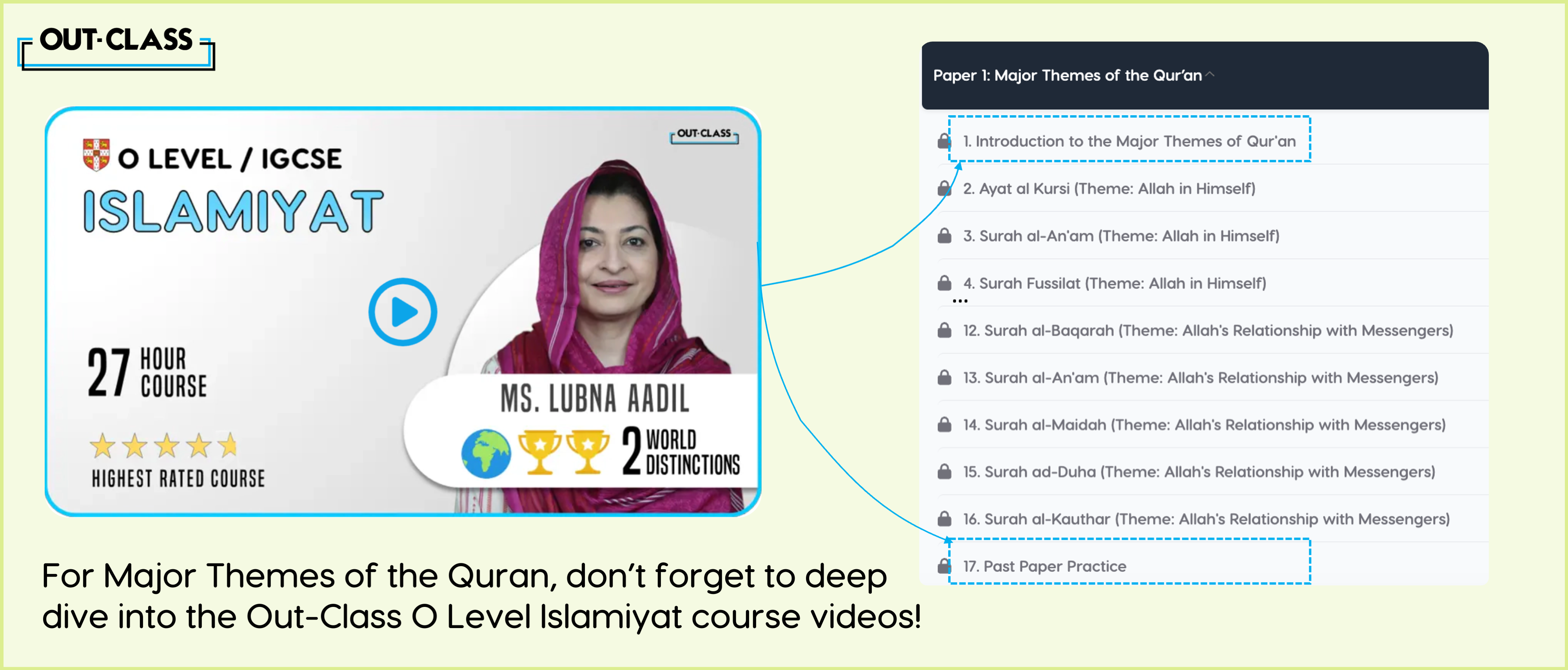Ever since we’ve grown up, at least in Pakistan, IGCSE or O Level Islamiyat is our first formal introduction to the Quran. Those who belong to Islam have memorized it and use it quite frequently.
So today, we're diving into this fascinating subject: the major themes of the Quran, particularly focusing on the IGCSE & O Level Islamiyat syllabus. This journey will explore the history and importance of the Quran, its relationship with Hadith, and the story behind its first revelation.
The Quran: A Brief History and Its Importance
First things first, the Quran is the holy book of Islam. It is regarded as the word of God (Allah) as revealed to the Prophet Muhammad.
For Muslims, it's a guide for life and a source of spiritual and ethical teachings across all walks of life. In the context of O Level Islamiyat, understanding the Quran's history enhances the appreciation of its significance in Islamic culture and beyond.
Relationship Between Quran and Hadith
Now, let’s talk about the Quran’s relationship with Hadith. While the Quran is the primary source of Islamic teachings, Hadiths are the recorded sayings and actions of Prophet Muhammad. They complement and explain the Quranic teachings, providing practical examples of how to implement them in daily life. In Islamiyat, studying them both helps students grasp the full spectrum of Islamic teachings.
The First Revelation of the Quran
The story of the first revelation of the Quran is a cornerstone in Islamic history. It began when Prophet Muhammad, during one of his retreats in the cave of Hira, received his first revelation from the angel Jibraeel.
This moment marked the beginning of his prophethood and the revelation of the Quran over the following twenty-three years. Understanding this event is crucial for comprehending the Quran's emergence and its impact on the Islamic faith. Especially the state of anxiety our prophet experienced while the Quran was being revealed upon him.
Major Themes Explored in the Quran
The Quran covers a range of themes, all vital for an A* in O Level Islamiyat:
1. Tawhid
The belief in the oneness of God is central to Islamic teachings. The Quran emphasizes that Allah is the only deity, creator, and sustainer of the universe.
Surah Al-Ikhlas (112:1-4): "Say, 'He is Allah, [who is] One, Allah, the Eternal Refuge. He neither begets nor is born, nor is there to Him any equivalent.'"
2. Prophethood:
It introduces various prophets sent by God to guide humanity, including Adam, Noah, Abraham, Moses, Jesus, and Muhammad, each playing a significant role in Islamic theology. But the most important element is that Prophet Muhammad is the last prophet of Allah.
Surah Al-Ahzab (33:40): "Muhammad is not the father of [any] one of your men, but [he is] the Messenger of Allah and last of the prophets."
3. Life After Death and Judgment:
The Quran frequently discusses the afterlife, resurrection, and the Day of Judgment, stressing accountability for one’s actions.
Surah Al-Mulk (67:2): "He who created death and life to test you [as to] which of you is best in deed - and He is the Exalted in Might, the Forgiving."
4. Moral and Ethical Conduct:
It guides virtues like honesty, compassion, and justice, and condemns vices such as dishonesty and oppression.
Surah Al-Baqarah (2:267): "O you who have believed, spend from the good things which you have earned and from that which We have produced for you from the earth."
5. Social Justice:
The Quran addresses issues like poverty, orphans’ rights, and fair treatment of all individuals, promoting a just and equitable society.
Surah Al-Ma'un (107:1-3): "Have you seen the one who denies the Recompense? For that is the one who drives away the orphan and does not encourage the feeding of the poor."
6. Ritual Worship:
It lays down the practices of worship like prayer, fasting, pilgrimage, and almsgiving, which are pillars of Islamic faith.
Surah Al-Baqarah (2:197): "And take provisions, but indeed, the best provision is Taqwa. So fear Me, O you who are understanding."
Conclusion
Understanding the major themes of the Quran is not just about religious study; it's about gaining insights into a rich tradition that has shaped the world in various ways. For IGCSE/O Level Islamiyat students, this exploration opens doors to a deeper appreciation of Islamic heritage and its contributions to global culture. Remember, the journey through the Quran is as much about discovering history as it is about understanding the present and looking towards the future. Happy learning!
For more in-detail learning, deep dive into the Out-Class O Level & IGCSE Islamiyat Crash Course Videos!
What IGCSE/O Level Islamiyat Crash Course Unveils: A Sneak Peek
- Focused Revision: No more drowning in a sea of information. The Out-Class IGCSE/O Level crash course hones in on the key topics, ensuring your revision is targeted and effective.
- Exam Strategies: Ace your IGCSE & O Level Islamiyat exam with proven strategies that go beyond rote memorization. We equip you with the skills to tackle any CAIE question with finesse.
- Quick Mastery: Short on time? No problem! Our crash course is designed for swift yet thorough understanding, getting you up to speed in no time.
Here is a visual SNEAK PEEK into how this topic is taught:
Most Common Repeated Questions:
Unlock the secrets to acing your CAIE IGCSE/O Level exams with a sneak peek into the most frequently asked questions that have graced the pages of IGCSE/O Level Islamiyat past papers!
- Discuss the most important features of the teachings in the Qur'an about the Messengers of God. [Specimen 2009]
- From the Qur’anic passages you have studied, outline the relationship between God and two of His messengers who were sent before the Prophet Muhammad. [May/June 2011, 2013, 2019] [Oct/Nov 2015]
- From passages you have studied from the Qur’an, write about God’s relationship with humankind. [May/June 2012, 2015, 2018]
- a) Using passages you have studied, write about the main teachings about God in the Qur’an.
b) How might these teachings affect a Muslim’s life today? [Oct/Nov 2013, 2018]




